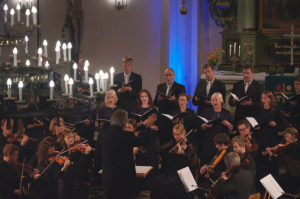
The Estonian Philharmonic Chamber Choir kicks off its new season with concerts in September in Milan, Turin, Assisi (Perugia), Helsinki and Moscow. The repertoire focuses mainly on two names in Estonian music – Arvo Pärt and Tõnu Kõrvits, but includes also great composers from previous periods – J. S. Bach and Robert Schumann.
The first concerts will be given together with the Tallinn Chamber Orchestra under Risto Joost, performing Tõnu Kõrvits’s ‘Moorland Elegies’ at the Mito SettembreMusica Festival. Kõrvits is a rising star in Estonian contemporary music, more and more frequently performed in his native country as well as foreign countries. Two concerts in Milan and Turin will be followed by the cooperation with the Perugia Chamber Orchestra and the conductor Filippo Maria Bressan at the Festival Sagra Musicale Umbra. The next tour will take the choir to Helsinki to celebrate the 20th anniversary of the Helsinki Baroque Orchestra under the baton of Aapo Häkkinen. The last concert in September will be given in Moscow at the festival Spiegel im Spiegel dedicated to Arvo Pärt’s music.
The list of guest conductors in the season 2017/2018 include Tõnu Kaljuste, Risto Joost, Aapo Häkkinen, Filippo Maria Bressan, Nikolai Aleksejev, Jaan-Eik Tulve and Peter Phillips.
MITO SettembreMusica. Tõnu Kõrvits. Moorland Elegies
13.09 at 21.00 Church of Sant’Alessandro in Zebedia, Milan, Italy
14.09 at 21.00 Conservatory Hall, Turin, Italy
ARVO PÄRT. Salve Regina
TÕNU KÕRVITS. Moorland Elegies
Estonian Philharmonic Chamber Choir
Tallinn Chamber Orchestra
Conductor Risto Joost
MITO SettembreMusica Festival is hosted each year in autumn in two major cities of Italy, in Milan and Turin featuring 160 concerts of classical music with international soloist and ensembles from all over the world. The EPCC has appeared at this festival twice before, this time the choir is invited together with the Tallinn Chamber Orchestra and its chief conductor Risto Joost to perform Tõnu Kõrvits’s ‘Moorland Elegies’.
Tõnu Kõrvits’s works belong to the repertoire of the most important Estonian orchestras, choirs and artists. In recent years his music has been performed more and more outside Estonia. His composition ‘Moorland elegies’ (2015) is a choir cycle on the texts of Emily Brontë. The work was awarded the Cultural Prize of the Republic of Estonia in 2016. It has been recorded and released by Ondine this year and has received already international recognition.
The concert is produced by MITO SettembreMusica Festival
FESTIVAL SAGRA MUSICALE UMBRA
17.09 Basilica Superiore di San Francesco, Assisi, Perugia, Italy
ARVO PÄRT. Berliner Messe
JOHANN SEBASTIAN BACH. Magnficat BWV 243
ARVO PÄRT. Magnificat
Estonian Philharmonic Chamber Choir
Perugia Chamber Orchestra
Conductor Filippo Maria Bressan
The concert is produced by Sagra Musicale Umbra Festival
HELSINKI BAROQUE ORCHESTRA 20
24.09 Musiikitalo, Helsinki
ROBERT SCHUMANN. Vom Pagen und der Königstochter, op. 140; Adventlied, Op. 71
JOHANN SEBASTIAN BACH. Herr, gehe nicht ins Gericht, BWV 105
Carolyn Sampson (soprano), Benno Schachtner (countertenor), Werner Güra (tenor), Jonathan Sells ja Cornelius Uhle (basso)
Estonian Philharmonic Chamber Choir
Helsinki Baroque Orchestra
Conductor Aapo Häkkinen
FESTIVAL SPIEGEL IM SPIEGEL
20.09 Saint Peter and Saint Paul Cathedral, Moscow
ARVO PÄRT. Kanon pokajanen
Estonian Philharmonic Chamber Choir
Conductor Tõnu Kaljuste
The whole-evening composition ’Kanon pokajanen’ is a major a cappella work by Arvo Pärt. It was commissioned for the 750th anniversary of Cologne Cathedral and is dedicated to Tõnu Kaljuste and the Estonian Philharmonic Chamber Choir who where its first performers in 1998. The work was recorded for ECM and was nominated for Grammy Award twice. The EPCC has performed this work at many venues and festivals all over the world, including Metropolitan Museum of Art in New York, Vale of Glamorgan Festival, Wratislavia Cantans etc.
’Kanon pokajanen’ is based on the canon of repentance, which already appears in the earliest Church Slavonic manuscripts. Arvo Pärt discovered that text many years ago, when he became involved in the tradition of the Russian Orthodox Church and it made a profound impression on him. The composer has said that he had tried to use language as a point of departure. „I wanted the word to be able to find its own sound, to draw its own melodic line. The resulting music is entirely immersed in the particular character of Church Slavonic, a language used exclusively in ecclesiastical texts.”
The concert is produced by Festival Spiegel im Spiegel.